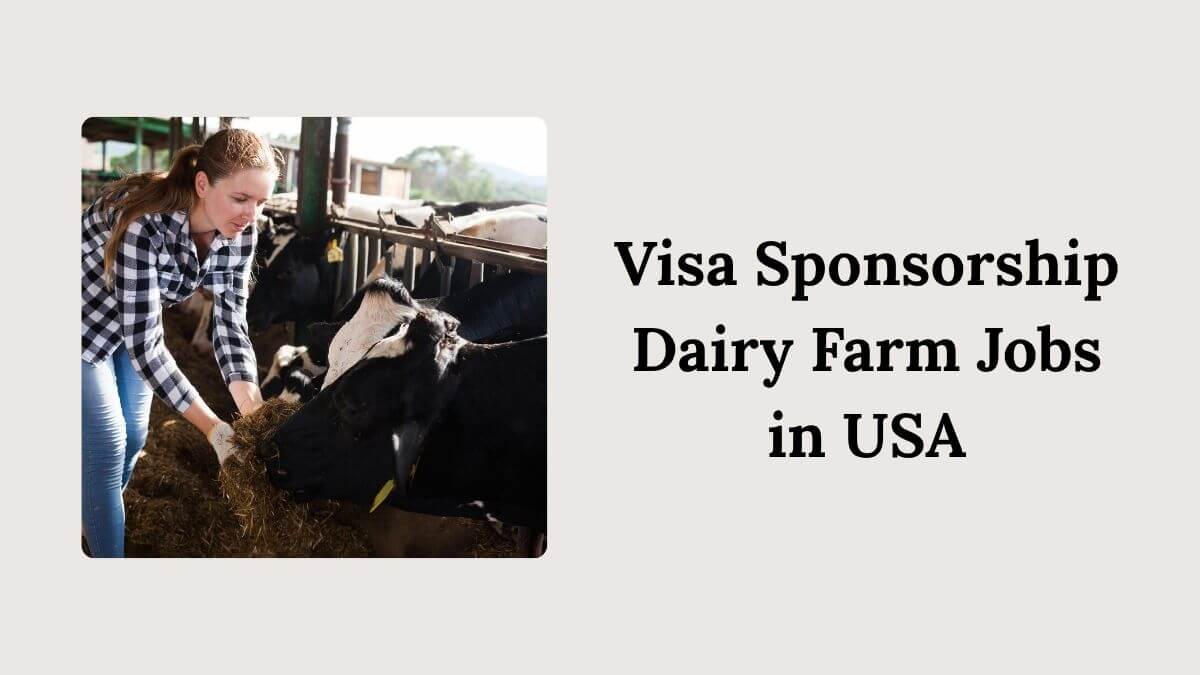Visa-sponsored dairy farm positions in the United States offer exceptional employment opportunities to individuals seeking work in the agricultural sector. Typical responsibilities include supervising agricultural machinery, tending to livestock, and nursing cows. The provision of visa sponsorship allows non-citizen laborers to explore lucrative career prospects in the ever-evolving U.S. dairy industry, with salaries typically ranging from $28,000 to $35,000 per year depending on experience and role.
This endeavor not only addresses labor shortages but also fosters cultural interchange and diversity among agricultural personnel. Prospective candidates can enhance their knowledge of the country’s illustrious agricultural heritage while contributing to the American dairy industry. This arrangement benefits both employers and employees alike.
Living and Working Conditions:
Employment in the dairy farming industry frequently entails living on or near the farm, thereby offering a distinctive rural lifestyle. Employees may be granted access to dairy products produced on the farm and can partake in a strong sense of community.
Future Outlook:
Anticipated to endure is the need for proficient labor on dairy farms in the United States, thereby sustaining continuous employment prospects.
Additionally, technological advancements may impact the skill set necessary for particular positions on contemporary dairy farms.
Types of Visa Sponsorship Dairy Farm Jobs in USA:
- Farm Manager: supervises daily operations, supervises personnel, and assures the efficient management of the dairy farm.
- Milker/Herdsman: The duties of a milker or herdsman include watering cows, ensuring the well-being of the herd, and carrying out regular tasks associated with dairy farming.
- Feed Technician: Oversees feed delivery and preparation, ensuring that the dairy livestock receives adequate nutrition.
- Veterinary Technician: The veterinary technician provides support in the provision of animal health care, including medication administration and livestock health monitoring.
- AI Technician: an artificial insemination specialist with the responsibility of optimizing breeding programs and preserving livestock genetics.
- Machinery Operator: Performs maintenance and operation of agricultural machinery, such as tractors and other equipment utilized in the course of daily activities.
- Quality Control Inspector: Oversees hygiene practices on the farm, monitors milk quality, and ensures compliance with safety standards.
- Calf Raiser: The role of the calf raiser is to oversee the development and care of calves, ensuring that they mature into productive, healthy dairy cows.
- Administrative Assistant: Manages records, documents, and administrative responsibilities pertaining to the operations of the dairy farm.
- Research and Development Specialist: Obligates to implement new technologies and conduct studies to increase the efficacy of dairy production.
Benefits:
- Job Security: The dairy industry is a stable and enduring sector that offers job security over the long term to those who work in it.
- Physical Work: Working on a dairy farm entails physical tasks such as milking cows, feeding animals, and maintaining farm equipment, which can be rewarding for those who appreciate manual labor.
- Relationship with Nature: Dairy farm jobs offer a strong connection to nature and the outdoors, allowing individuals to labor in rural, natural environments.
- Competitive Compensation: Due to the significance of skilled farm laborers, several dairy farm positions offer competitive pay.
- Employability Skills: Individuals who work on dairy farms gain transferable skills in animal husbandry, equipment operation, and crop management that are applicable in a variety of agricultural contexts.
- Animal Well-being: Frequently, dairy farm employees contribute to the ethical and humane treatment of the animals by ensuring their health and well-being.
- Educational Opportunities: Working on a dairy farm provides opportunities to learn about animal care, crop cultivation, and farm administration, making it an excellent stepping stone for individuals interested in agriculture.
- Lack of dependence: Some farm positions provide autonomy in managing daily duties, including the ability to make operational decisions.
- Environmental stewardship: Contributing to environmental efforts, numerous dairy farms prioritize sustainable and eco-friendly practices, such as refuse management and land preservation.
- Nutritional Knowledge: Working in the dairy industry can heighten awareness of the significance of dairy products in a healthy diet.
- Community Participation: In rural communities, dairy farms frequently nurture a sense of community engagement and support.
- Cultural Knowledge: Depending on the location, working on a dairy farm can be a cultural experience, particularly in regions with traditional agricultural methods.
- Group work: Numerous duties requiring collaboration with other farm workers necessitate frequent teamwork on the farm.
- Persona Development: Adapting to a rural workplace can lead to personal development, adaptability, and the formation of a strong work ethic.
- Family Enterprises: Some dairy farms are family-owned, providing family members with the opportunity to labor together and maintain a strong family bond.
Check Also: Latest H2B Visa Sponsorship Jobs in USA – Apply Now
Qualifications Required:
- Educational Background: Generally, an academic foundation in animal science, agriculture, or a closely related discipline is favored.
- Proficiency in Dairy Farming: Demonstrated track record in dairy farming, encompassing expertise in milking protocols, livestock administration, and health protocols.
- Physical Fitness: Physical stamina is a prerequisite for dairy farm work; applicants must be able to perform manual labor while operating in a variety of weather conditions.
- Proficient in Animal Welfare: Comprehend the fundamental tenets of animal welfare and exhibit a steadfast dedication to safeguarding the welfare of dairy cattle.
- Practical Experience: Expertise in the operation and upkeep of agricultural apparatus and equipment.
- Meticulousness: Precise execution of duties such as milking, feeding, and herd health surveillance is imperative for the farm’s overall prosperity.
- Communication Skills: Communication skills are critical for coordinating tasks and promptly addressing issues, particularly in a team environment.
- Adaptability: The capacity to adjust to the ever-changing demands of the dairy farming industry, such as fluctuations in labor due to the seasons,
Responsibilities:
- Milking Operations: Ensure the health and productivity of the dairy livestock by carrying out hygienic and effective milking procedures.
- Animal Health Monitoring: Consistently inspect and communicate the well-being of dairy cattle, recognizing indications of disease or distress.
- Feeding and Nutrition: Ensure optimal milk production by managing feeding schedules and ensuring a balanced diet.
- Equipment Maintenance: Implement a regular maintenance schedule for farm apparatus and equipment to avert any potential disturbances to the daily operations.
- Record Keeping: Maintain precise documentation on livestock health, milk production, and other pertinent information.
- Barn and Facility Maintenance: Maintain the cleanliness and upkeep of facilities such as barns and dairy parlors.
- Assist in Breeding Programs: Provide support for breeding programs by engaging in collaborative efforts with breeding specialists to ensure their success.
- Team Collaboration: Collaborate effectively with fellow farm personnel to accomplish operational objectives while preserving a cohesive workplace atmosphere.
Visa Sponsorship Opportunities:
Certain dairy farms in the United States recruit competent laborers from abroad and provide visa sponsorship to address labor shortages. Foreign nationals frequently use the H-2A visa program to work as temporary agricultural laborers on U.S. farms for a set period.
Application Process of Dairy Farm Jobs in USA:
- One may submit applications to dairy farms directly or investigate potential employment prospects via agricultural job forums and websites.
- In addition to participating in interviews and submitting a resume, the application process may require the demonstration of pertinent skills.
Conclusion:
Opportunities exist for individuals with a passion for agriculture and a desire to work in a rewarding industry to obtain dairy farm positions in the United States. Visa sponsorship programs facilitate the integration of foreign laborers into the American dairy farming sector, enabling them to contribute their expertise and promoting a dynamic and heterogeneous labor force. Prospective candidates should familiarize themselves with the visa application process, investigate available opportunities, and be ready to confront the rigors and rewards of a dairy farming career.
Frequently Asked Questions:
What are the top 5 dairy states?
The top five milk-producing states were California, Wisconsin, Idaho, Texas, and New York. Collectively, these five states produced more than 50 percent of the U.S. annual milk supply.
How much do dairy farm workers make in the US?
The estimated total pay for a dairy farm worker is $51,798 per year in the United States, with an average salary of $48,866 per year. These numbers represent the median, which is the midpoint of the ranges from our proprietary Total Pay Estimate model and is based on salaries collected from our users.
Is a dairy farm profitable in the USA?
On average, farms with less than 250 cows will make just $125 to $170 per cow, while those with more than 1000 or 5000 cows will earn about three to five times that level. The least profitable region is expected to be the Southwest, and farms below 250 cows are expected to lose money.






